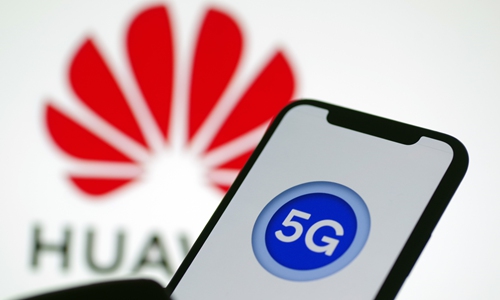'D10' 5G club an outdated idea with Cold War mind-set
By Yu Ning Source:Global Times Published: 2020/5/31 22:05:08

Photo: IC
It was less than six months ago that the Boris Johnson government granted Chinese tech company Huawei a limited role in the country's 5G networks, but recently it's widely believed that the UK is signaling an about-face.
Shortly after news broke that the UK government was drawing up plans to force a full phase-out of Huawei from Britain's 5G networks by 2023, it was reported Friday that London was proposing a "D10" club of democratic partners that includes the G7 nations, Australia, South Korea and India to reduce dependence on Huawei 5G technology.
The UK's seemingly untenable position on Huawei is not completely unexpected. For one thing, the US has been pressuring Britain to reconsider its decision of including Huawei as one of the country's 5G network suppliers. For another, there has been a loud group of China-skeptic MPs urging the UK government to scrap the decision on Huawei citing the excuse that it could compromise national security.
The D10 proposal hopes to form an alliance of 10 democracies to create an alternative pool of 5G equipment and technologies to Huawei. It is another sign that UK decision-making still bows to US pressure. By rallying 10 like-minded countries against China, the plan is largely a Cold War-style design. But today's world can't be dominated by ideology as it was during the Cold War era.
For many of the D10 countries including South Korea, Germany and the UK itself, their telecom operators have deep cooperation with Huawei. If the company is excluded from their 5G rollout, their 5G development will be delayed, crippling their national competitiveness on the international stage. Therefore, it's hard to say whether the D10 club will be easily formed. Even if it comes into being, there will be many uncertainties about whether it can function effectively.
The idea of D10 also reflects that some Western countries still view technological issues through political lenses. Many of these countries, which used to be advanced technology leaders, cannot accept and adapt themselves to the fact that China is leading the world in 5G technology. Some Western politicians and media outlets are hyping up the "threats" China's 5G technology may bring. China has adopted technologies from the West in its development, but China has never narrowly believed they are security threats.
China's 5G technology has aroused suspicion and anxieties in some Western countries. They are upset that the West is losing its technological superiority and because of their deep-rooted ideological prejudice against the Chinese political system.
With the US ratcheting up its crackdown on Huawei and intensifying confrontation with China, the Huawei 5G issue has wide ramifications. If the UK allies with the US against Huawei, that means taking sides between the two biggest economies and blindly following the US in a technological Cold War with China. In that case, the UK cannot expect China to treat it the same as before in terms of economy and trade. Britain should avoid being manipulated by the US and serving the latter's interests as foolishly as Australia.
German Chancellor Angela Merkel said in January that she would advise against regarding China as a threat "simply because it is economically successful." It would be wise for European countries to consider this advice. It's in their interests to treat advanced technology fairly and rationally.
RELATED ARTICLES:
Posted in: OBSERVER